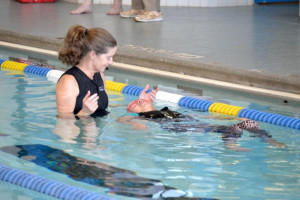When Adaptive Sports New England president Joe Walsh decided to start the Paralympic Sport Club Boston swimming program last year, Paralympic gold medalist Michael Prout was the first coach on board. Michael started swimming when he was six, started training for the Paralympics at 16, and went on to compete in the Athens 2004, Beijing 2008 and London 2012 Games. Back in college, Michael went on to coach able-bodied swimmers, and when he moved back to Boston, Walsh recruited him as a coach. “I had been coaching and I was in the Paralympics, so it was a great fit.”
 The Paralympic Sport Club Boston swimming program is unlike any other in Boston. Focused exclusively on swimmers with visual or mobility impairments, the program runs October through June. A coach to athlete ratio of 1:2 ensures that every swimmer gets individualized attention on goal setting and technique, most specifically on stroke or training adaptations necessary to maximize their performance in spite of their impairments. “That’s what we are here for. We take that time and work with each person, and they go and use that for the rest of the week.” says Michael. The program welcomes a wide range of ages with some swimming for fitness and others training for the Tokyo 2020 Paralympic Games.
The Paralympic Sport Club Boston swimming program is unlike any other in Boston. Focused exclusively on swimmers with visual or mobility impairments, the program runs October through June. A coach to athlete ratio of 1:2 ensures that every swimmer gets individualized attention on goal setting and technique, most specifically on stroke or training adaptations necessary to maximize their performance in spite of their impairments. “That’s what we are here for. We take that time and work with each person, and they go and use that for the rest of the week.” says Michael. The program welcomes a wide range of ages with some swimming for fitness and others training for the Tokyo 2020 Paralympic Games.
Elise Morley is one swimmer focused on Tokyo. Elise is a junior at Norton High School and swims for 2-3 hours after school every day with her high school team or the Bluefish Swim Club in Attleboro. Elise drives an hour each way on Sundays to train with Prout and the PSC Boston group.
“Swimming at the Adaptive Sports program is a confidence builder for Elise,” said her mom, Beth. “She wants to inspire kids to be on their high school team.” Elise likes the PSC Boston program because she can get specific help from swimmers and coaches who may have the same disability as her. Elise believes, “if you train really hard, then you will get there.” She really values that Coach Prout brings the experience of having trained full-time to get to the Paralympics where she wants to go.
PSC Boston is not just about training for the Paralympics, though. “Only a very small fraction of athletes who have visual or mobility impairments will ever make a Paralympic Team, but every kid and every adult can play sports and enjoy all the benefits sport brings,” said president Walsh. PSC Boston is for swimmers with visual or mobility impairments who are ready to be part of a team training program whether they end up competing or not.”
Humaira, one of the group’s more novice swimmers, was diagnosed with muscular dystrophy when she was five and had never had an interest in sports until she joined the program last season. Now twelve years old, Humaira’s family feels that swimming has “changed her physically, mentally and socially,” and she now swims 2-3 times a week.
This blog post was created by PRLab at Boston University for Adaptive Sports New England
